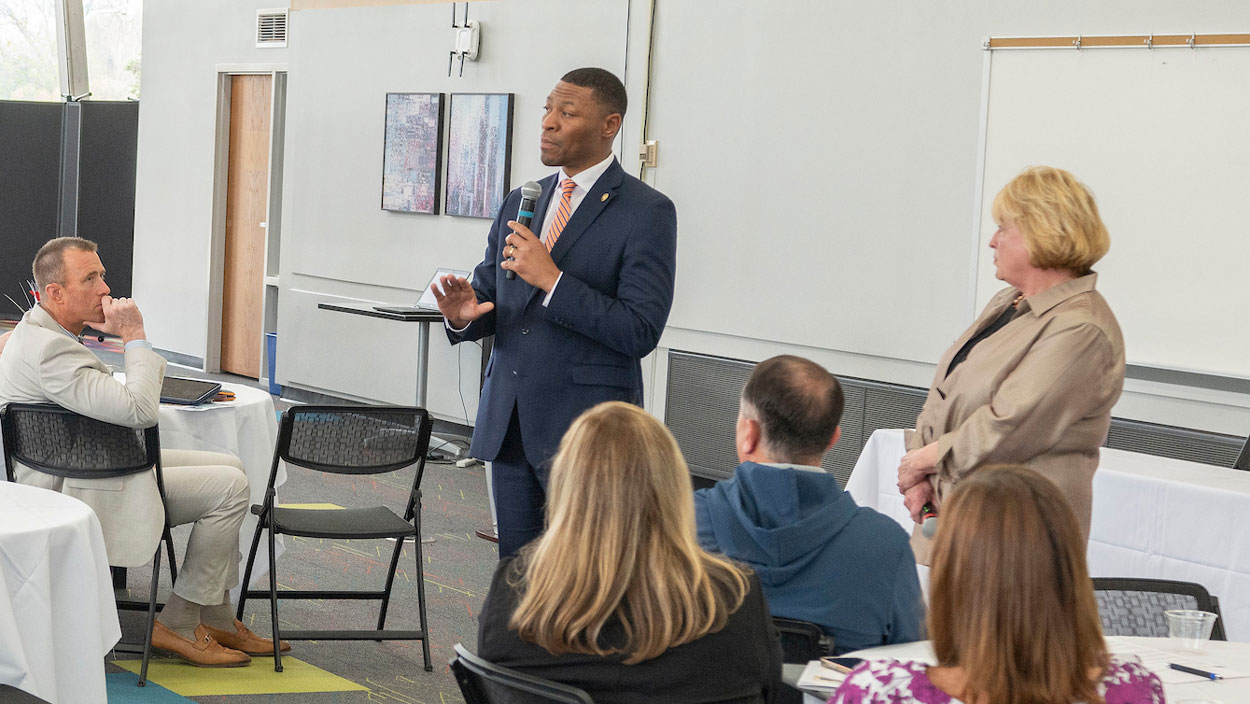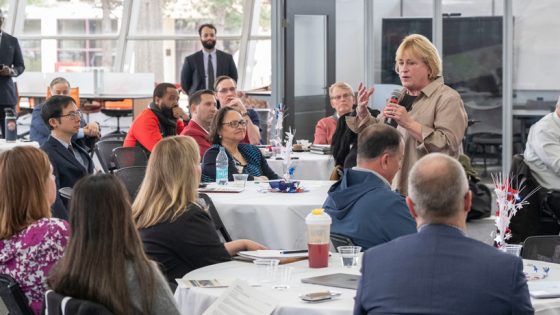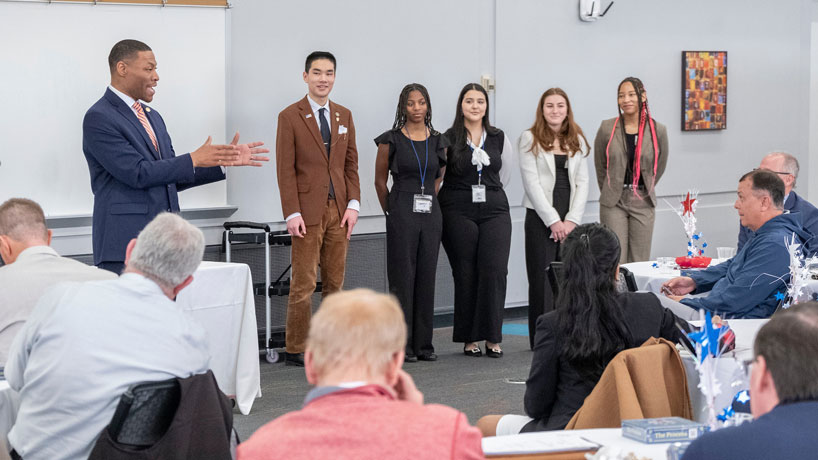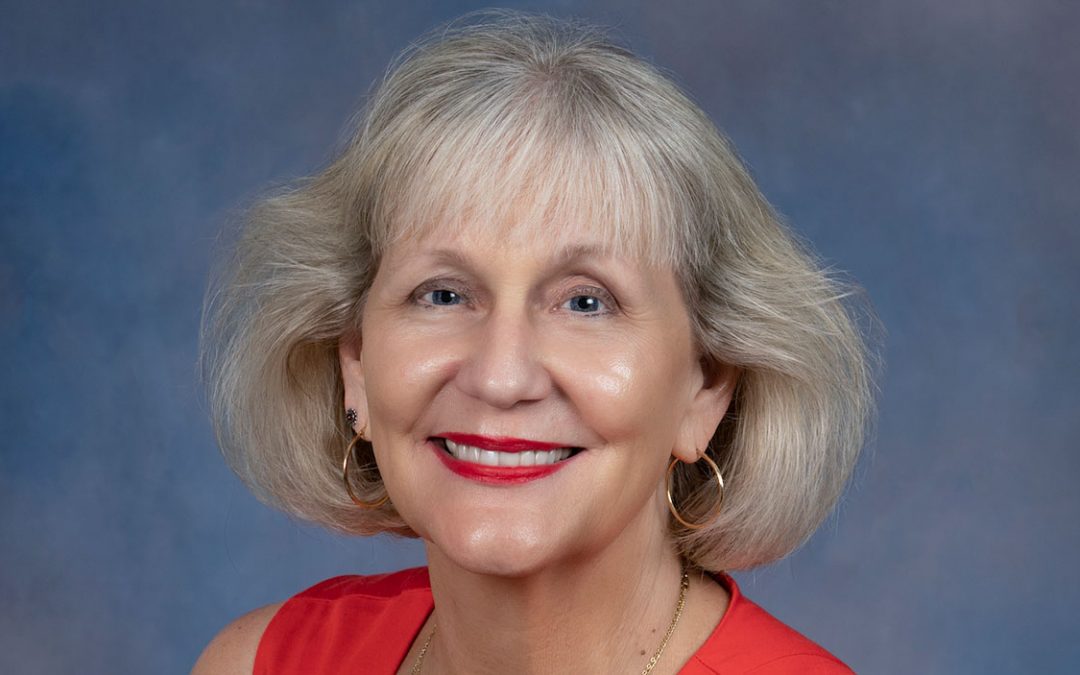
Missouri Sen. Brian Williams (left) and Missouri Department of Elementary and Secondary Education Commissioner Karla Eslinger (right) take questions from the audience during Friday’s event at the Ed Collabitat on UMSL’s South Campus. Williams and Eslinger connected with more than a dozen superintendents from local school districts and heard from from students working on a civic engagement project. (Photos by Derik Holtmann)
Missouri Sen. Brian Williams is not a teacher, but he does a pretty good impression of one.
Williams stood at a lectern Friday afternoon with sun streaming into the Ed Collabitat and welcomed more than 30 local education leaders, University of Missouri–St. Louis faculty and staff and community members. However, he wasn’t quite satisfied with the crowd’s initial response and implored everyone to put some feeling into the greeting.
“OK, we’ll try it one more time,” Williams said like an educator practiced in classroom management. “Say, ‘Good afternoon!’”
“Good afternoon!” the audience responded, satisfying Williams’ request.
Williams was on hand for an event hosted by the College of Education’s Center for Character and Citizenship. The first half of the day served as a forum for more than a dozen superintendents from St. Louis area school districts to connect and have a dialogue with Williams as well as Missouri Department of Elementary and Secondary Education Commissioner Karla Eslinger.
The second half of the day’s itinerary included a presentation by local students on their MyImpact Challenge project. The civic engagement contest highlights the work of students ages 13-19 who are actively engaged in service, volunteerism or entrepreneurship in their communities.
Williams underscored the importance that education plays in workforce development and the future success of the region.
“The St. Louis region – and when I say St. Louis region, that is St. Louis County, City, Franklin County, Jefferson County, St. Charles County – this region makes up roughly 45% of the GDP, meaning the students that you educate, the communities that you serve drive the economy for the entire state of Missouri,” he said. “With that being said, it’s imperative that we have conversations to ensure that and reflect that, and we are seeing that today clearly by your participation and attendance.”
Eslinger addressed the crowd after Williams, stressing the importance of communication between educators at the local level and officials at the state level.

Karla Eslinger engages with the crowd during a lively Q&A session.
“There’s never enough conversation,” she said. “How can we do it better? How can we provide support and service to you? Because you, as the superintendents, the people who take care of our schools, our classrooms, our teachers, the families, those communities, our job is to provide you support and service so you can do your job to take care of children.
“That’s my position as a department, as a commissioner of education. I want to be able to truly support the work that you’re doing, and if the current practices that we have in place don’t meet that challenge, don’t meet that need, then we need to look at them and be able to make revisions so that they do reflect the great work that you’re doing.”
Eslinger and Williams then opened the floor for a spirited Q&A session with attendees that covered issues including school funding, current education legislation and continued collaboration between educators and legislators.
Mindy Bier, co-director for the Center for Character and Citizenship, was thrilled with the robust turnout and for the audience to hear from local students working to make a difference in the St. Louis region.
“Your presence here speaks to something that we share, the belief in the power of community service to create lasting change and the incredible potential of our young people to lead that work,” Bier told the crowd. “At the center, we believe that service is one of the most powerful ways to practice leadership. It’s not about being in charge. It’s about showing up, listening and doing the work that helps others thrive. And today, you’ll hear from a group of students who have chosen to serve their communities with intention, creativity and heart.”
The day closed with a presentation on the MyImpact Challenge by five students from Aspirations Network, Williams’ youth advisory board. The students represented a wide swath of the region with Wayne Yue from the School District of Clayton, Lojin Ibnoucheikh from the Orchard Farm School District, Serenity Wilson-Mitchell from Saint Louis Public Schools, Lyla Stewart from the School District of University City and Savannah Ewing from the Pattonville School District. Overall, the organization represents 19 high schools in the region.
Ewing explained that the group decided to focus on collecting books at their schools to donate to the St. Louis County Juvenile Detention Center.

Missouri Sen. Brian Williams introduces five local students (from left to right) Wayne Yue, Savannah Ewing, Lojin Ibnoucheikh, Lyla Stewart and Serenity Wilson-Mitchell working on a MyImpact Challenge civic engagement project.
“All of our book drives have been very successful,” she said. “We’ve been doing them in homerooms, in libraries and commons, everything. Across these 19 schools, we have over 1,500 books so far, which is amazing. These books will then be sent to the St. Louis Juvenile Detention Center at the end of the summer, once they finish the completion of their library.”
Aside from collecting books, the students also hope to affect change at the center. They’re lobbying to change vague language in current policies with more specific mandates for learning spaces to meet the needs of incarcerated youth. There’s also the matter of learning outside of dedicated education hours.
“They’re also rarely allowed to take books or even homework back to their units,” Ibnoucheikh said. “As much as we all hate homework, it’s vital to expanding your knowledge outside of the classroom. At least 77% of formerly incarcerated youth are re-arrested within three years of their release. Now, if you put education to the mix, the recidivism rates drop. For example, a study shows that a GED reduces the recidivism rate to 40% and an associate degree further shrinks that to only 15%, which really emphasizes the importance of education in our detention centers.”
The students will present their project again on May 19 during the Missouri MyImpact Challenge showcase on the UMSL campus, where they’ll compete with others across the state for a $2,000 grand prize.
But for the time being, they appreciated the opportunity to share their hard work.
“I just wanted to take a moment to say thank you for listening to us,” Wilson-Mitchell said. “The root of our project is we just want to better our communities. When we better their community, it’s your community. It’s ours. So when we help them, we’re really helping our future and helping ourselves. Thank you so much.”














